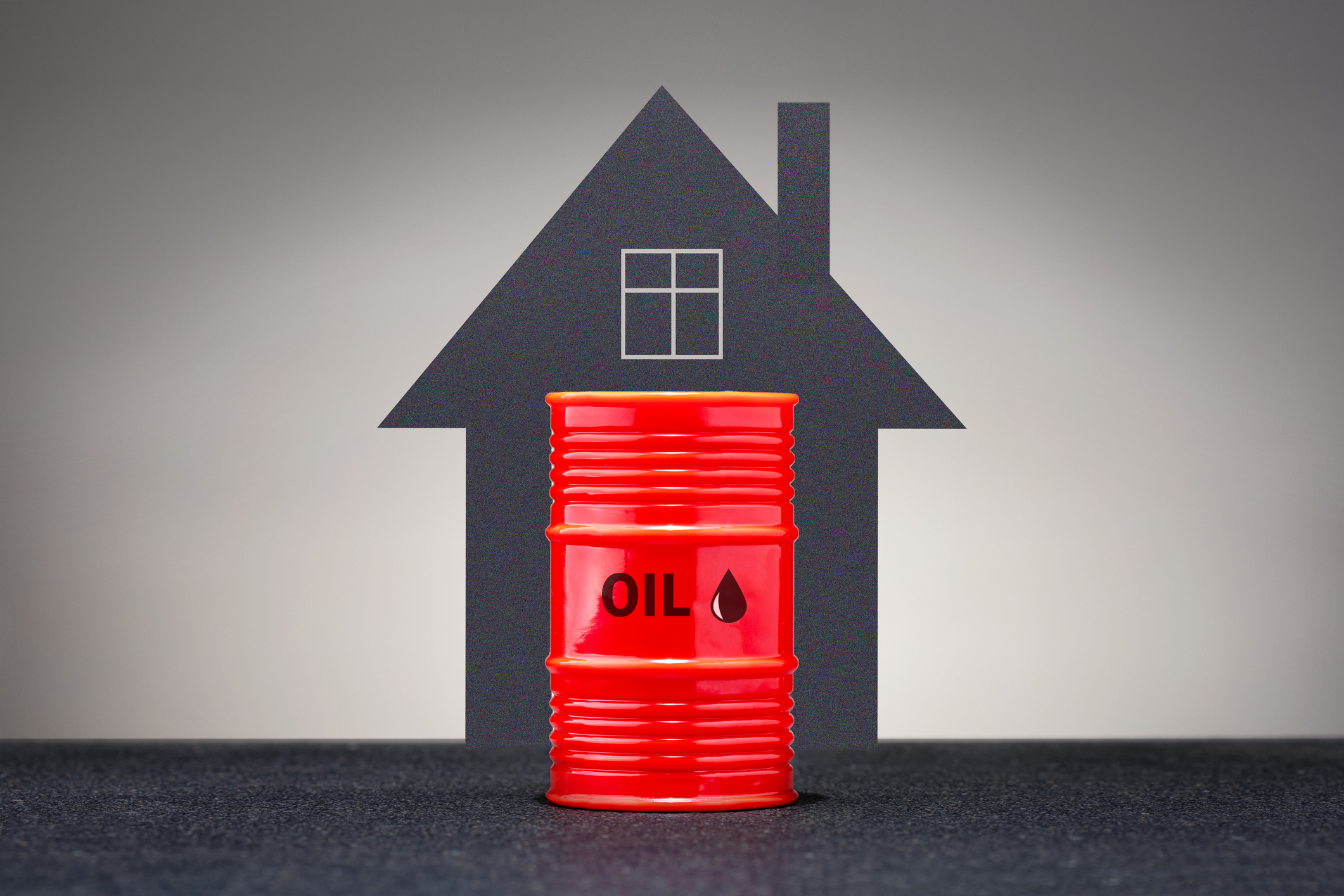What Are Home Heating Oil Prices Across the U.S.?
Home heating oil prices are high for most Americans. How much higher will they go as we head deeper into winter?

Donna LeValley

Profit and prosper with the best of Kiplinger's advice on investing, taxes, retirement, personal finance and much more. Delivered daily. Enter your email in the box and click Sign Me Up.
You are now subscribed
Your newsletter sign-up was successful
Want to add more newsletters?

Delivered daily
Kiplinger Today
Profit and prosper with the best of Kiplinger's advice on investing, taxes, retirement, personal finance and much more delivered daily. Smart money moves start here.

Sent five days a week
Kiplinger A Step Ahead
Get practical help to make better financial decisions in your everyday life, from spending to savings on top deals.

Delivered daily
Kiplinger Closing Bell
Get today's biggest financial and investing headlines delivered to your inbox every day the U.S. stock market is open.

Sent twice a week
Kiplinger Adviser Intel
Financial pros across the country share best practices and fresh tactics to preserve and grow your wealth.

Delivered weekly
Kiplinger Tax Tips
Trim your federal and state tax bills with practical tax-planning and tax-cutting strategies.

Sent twice a week
Kiplinger Retirement Tips
Your twice-a-week guide to planning and enjoying a financially secure and richly rewarding retirement

Sent bimonthly.
Kiplinger Adviser Angle
Insights for advisers, wealth managers and other financial professionals.

Sent twice a week
Kiplinger Investing Weekly
Your twice-a-week roundup of promising stocks, funds, companies and industries you should consider, ones you should avoid, and why.

Sent weekly for six weeks
Kiplinger Invest for Retirement
Your step-by-step six-part series on how to invest for retirement, from devising a successful strategy to exactly which investments to choose.
As the U.S. moves through winter, home heating oil prices continue to hover near record highs. Colder than expected winter weather, a global oil supply crunch and continued pandemic supply chain issues are delivering sticker shock energy bills for homeowners across the U.S.
Home heating oil prices: winter trajectory
The current national average for residential heating oil prices stands at $3.985/gallon as of January 1, 2024, according to the U.S. Energy Information Administration (EIA). After hitting a historical peak in early November 2022, the price has trended down but remains elevated. Here's the monthly trajectory since October 2023:
| Date | U.S. Heating Oil Price Avg. (USD/Gallon) |
|---|---|
| 12/25/23 | $3.996 |
| 12/18/23 | $3.978 |
| 12/11/23 | $4.022 |
| 12/04/23 | $4.129 |
| 11/06/23 | $4.226 |
| 10/02/23 | $4.387 |
Why are prices so high?
Home heating oil prices have more than doubled since a 2000s-era low of $2.06 in the winter of 2015/2016, according to Statista. In early November 2022, the average national price sat at $5.902, according to YCharts. Prices now sit near $4, less than the average price last year that was $4.663 on January 2, 2023.
From just $107.88 $24.99 for Kiplinger Personal Finance
Become a smarter, better informed investor. Subscribe from just $107.88 $24.99, plus get up to 4 Special Issues

Sign up for Kiplinger’s Free Newsletters
Profit and prosper with the best of expert advice on investing, taxes, retirement, personal finance and more - straight to your e-mail.
Profit and prosper with the best of expert advice - straight to your e-mail.
The increasing cold raises consumer demand and therefore the prices for heating oil each winter, covering the period from October through March. According to the EIA, a homeowner in the Northeast might use 850 gallons to 1,200 gallons of heating oil during a typical winter and consume very little during the rest of the year.
Crude oil accounts for 48% of the price of heating oil, and the war in Ukraine and related energy sanctions on Russia have generally caused oil prices to spike on a global basis. Production cuts from OPEC+ are expected in 2024. (OPEC+ includes OPEC and allies such as Russia.)
Many of the OPEC+ countries agreed to voluntarily cut oil production by a total of 2.2 million barrels per day in the first quarter of 2024 to blunt falling crude oil prices. Brazil is set to join the OPEC+ group of oil-producing countries in January.
Certain U.S. states rely more heavily on heating oil than others, which affects regional prices. The northern Atlantic region, from Maryland up to Maine, relies more on heating oil than natural gas to heat homes, exposing the region more heavily to global oil price fluctuations.
Many of these northeastern states rely on decades-old heating oil tanks and infrastructure. Three fifths of Maine households use oil as their primary energy source for home heating, a larger share than any other state, according to Quartz. This dynamic is one reason residential energy costs are 15.4% higher in the northeast than the rest of the U.S., where energy prices have actually started to fall.
What comes next for prices?
The EIA expects winter heating prices for U.S. households to remain relatively flat or decrease this season. Residents of the Northeast may be surprised to hear that, as their lack of refinery capacity, cold temperatures and concentrated demand can cause prices to fluctuate.
They assume temperatures for the winter of 2023–24 in the eastern part of the country will be slightly colder than last winter but warmer than the average of the previous 10 winters. And the EIA predicts the colder winter in the Northeast will result in 7% more heating heating degree days (HDDs) than last winter.
The EIA forecasts households that heat primarily with heating oil will use about 440 gallons on average this winter. At an average price of about $4.20/gal, they estimate average winter expenditures for those homes will be $1,850. And despite predicting heating oil will be 10 cents/gal less than last winter, expected increased consumption means spending will be $130 higher this winter.
Ways to manage and cut costs
To cut costs and save energy, all homeowners should strongly consider a home energy audit to find savings on their monthly bills. Being more energy efficient now will save you money overall and help you withstand any future price increases.
If your heating oil bills are driving you round the bend, you could also consider lowering your oil heater's temperature setting and making up the difference with a different type of heater. Consult our deep dives on fan heaters vs oil heaters, as well as electric heaters vs radiators.
For the latest on the direction of crude oil, gasoline and other fuels, see Kiplinger's Energy Prices Forecast.
Related Content
Profit and prosper with the best of Kiplinger's advice on investing, taxes, retirement, personal finance and much more. Delivered daily. Enter your email in the box and click Sign Me Up.

Ben Demers manages digital content and engagement at Kiplinger, informing readers through a range of personal finance articles, e-newsletters, social media, syndicated content, and videos. He is passionate about helping people lead their best lives through sound financial behavior, particularly saving money at home and avoiding scams and identity theft. Ben graduated with an M.P.S. from Georgetown University and a B.A. from Vassar College. He joined Kiplinger in May 2017.
- Donna LeValleyRetirement Writer
-
 Dow Adds 1,206 Points to Top 50,000: Stock Market Today
Dow Adds 1,206 Points to Top 50,000: Stock Market TodayThe S&P 500 and Nasdaq also had strong finishes to a volatile week, with beaten-down tech stocks outperforming.
-
 Ask the Tax Editor: Federal Income Tax Deductions
Ask the Tax Editor: Federal Income Tax DeductionsAsk the Editor In this week's Ask the Editor Q&A, Joy Taylor answers questions on federal income tax deductions
-
 States With No-Fault Car Insurance Laws (and How No-Fault Car Insurance Works)
States With No-Fault Car Insurance Laws (and How No-Fault Car Insurance Works)A breakdown of the confusing rules around no-fault car insurance in every state where it exists.